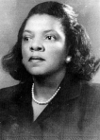1. Leopold Kronecker (Fundamental Theorem of Finite Abelian Groups) 
|
|
a. The quaternions are a ring that are not abelian under multiplication since ij=k, but ji=-k
|
2. Marjorie Lee Browne 
|
|
b. When we adjoin
any root r of
f(x)=x^6+6x^5+17x^4+32x^3+37x^2+26x+6
to the complex numbers C,
we still get C. I.e.
C(r)=C for all roots r.
|
3. Johann Carl Friedrich Gauss (Fundamental Theorem of Algebra)

|
|
c. Z_6={0,1,2,...,5} under +mod6 is the direct product of
Z_2={0,1} under +mod2 and Z_3={0,1,2} under +mod3.
|
4. Peter Ludwig Mejdell Sylow (Sylow's First Theorem)

|
|
d. Z_6={0,1,2,...,5} under +mod6 has
a subgroup of order 2
Z_2={0,3} under +mod6
and a
subgroup of order 3 Z_3={0,2,4} under +mod6.
|
5. Sir William Rowan Hamilton

|
|
e. Z_6 is a ring but not a field
|
6. Evariste Galois

|
|
f. Z satisfies the ACC condition on ideals since every ascending chain of ideals terminates at some point.
|
7. Emmy Amalie Noether

|
|
g. Z_3 is a finite field
|
8. Julius Wihelm Richard Dedekind

|
|
h. 2x2 matrices with determinant 1 satisfying A times A transpose equals the identity form a group under matrix multiplication.
|